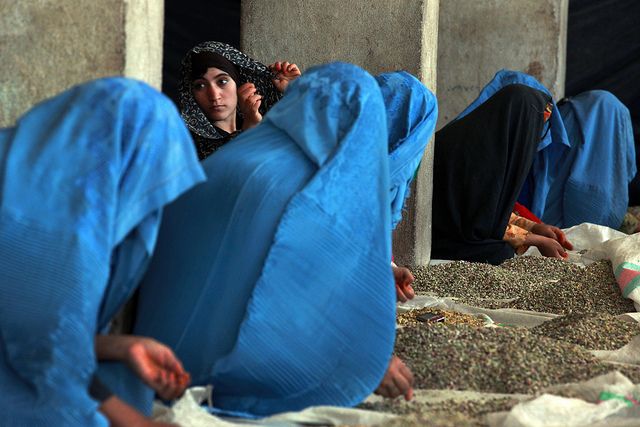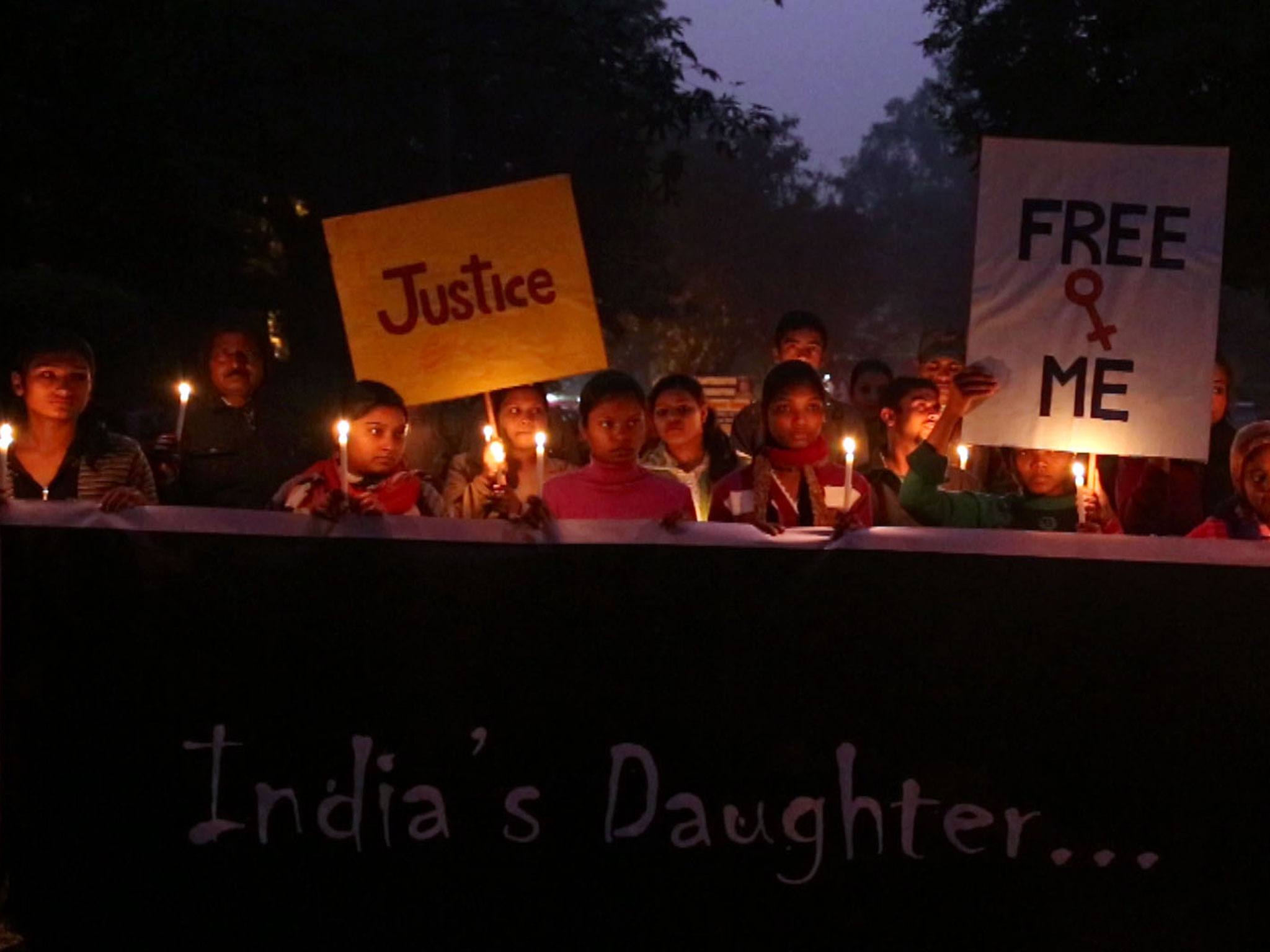Women
Afghanistan: A Country where women have no face and no voice

flickr/un_photo
Women have no face and no voice, being born as a women in Afghanistan is a curse, ordeal, torture and constant struggle for self respect and survival; says Aaqila (name changed) a former Television journalist who was forced to flee her country with her two year old son and has taken refuge in Nepal.
Aaqila was subjected to torture and insult. Only because she was educated and a career oriented women in a conservative society, her husband criticized her, humiliated her, and believed that she brought disgrace and disrespect to him and his family. She was stabbed in her head, arms and chest with a screwdriver, unable to bear the torture and escape the horrendous crime by her husband; she decided to flee to Nepal. She is today living as an urban refuge.
The laws in Afghanistan are too weak to protect women, as even though she was constantly insulted, beaten, abused and humiliated by her heroin addict husband who even threatened her of acid attack, none of the family members or authorities took any action, they always blamed her for the treatment she received.
Afghan woman forced to flee her country to escape domestic violence.
Incidents of violence against women are common in Afghanistan. Being a tribal and patriarchal society, it does not believe in rights and equality for women. Men beat and abuse, their wives, children and sisters, without any fear of punishment. Most of the incidents remain largely under-reported because of cultural restraints, social norms and religious beliefs that women are inferior and secondary to men.
Afghan women have it worst and suffer abuse despite the law to protect them which was enacted in August 2009 aimed to eliminate violence against women law and criminalizes child marriage, selling and buying women to settle disputes, assault and more than a dozen other acts of violence and abuse against women, according to an UN Report.
There was some hope after the fall of Taliban regime in 2002; things slowly began to change in the country and it was during this period that women in Afghanistan started to emerge from the oppression of the Taliban and many embraced the freedom and change. A big step towards the change was when many educated women and young girls preferred to shed their burqa in public, as a mark of freedom and identity. Educated women were slowly getting their foot back in mainstream profession as teachers, doctors, politicians, human activists, lawyers and media.
The change was very inspiring and encouraging for Aaqila she was looking forward for opportunities as a media professional, when the National Television Channel that was re-launched with headquarters’ in Kabul. Being young, dynamic and passionate about her country and people, she decided to peruse a career in Media and joined the Afghan National Television, at the time when many women were seen on television as anchors, news editors, singers on talent shows and so on. It was after a decade of oppression, that their faces and voices were heard on the radio and television broadcasting various programs.
Within no time, she gained her confidence and was doing extremely well in her career and was optimistic that she will go a long way in professional life. Unfortunately, her parents married her to her uneducated first cousin who was a heroin addict. Her father had borrowed some money and was unable to pay back his debt, so the family decided to settle the debt by getting her married to the creditor.
Life for Aaqila took a U-turn, immediately after her marriage her ordeals started, she was first asked to cover her herself with Burqa (Veil) and was not allowed to go out alone. She was asked to quit her job and raise a family staying inside their house without any social interaction or professional communication. She was in for a rude shock, she was constantly abused and cursed that she brought shame to the family by going around uncovered and working in National TV for which she was tortured and abused every day.
Forced marriage, often of underage girls, is still common in many parts of Afghanistan. It is a traditional and religious way of settling dispute which is still practiced largely in the country. There have been reports of families of raped young girls, being forced to sell their daughters to her rapist because their community decides that it is the only way her family can recover from the shame of the rape, as mentioned by UN reports from Afghanistan.
A 2012 survey by the United Nations Development Fund for Women (UNIFEM) found that 87% of the women they surveyed had experienced physical and/or psychological abuse at the hands of their families and domestic violence. The report concluded “Violence against women is an epidemic in Afghanistan”. The Afghan women are still among the worst treated in the world. As per United Nations, violence and rape against them is a “huge problem”.
Aaqila feels sad and helpless for herself and other women like her in Afghanistan, who have no freedom and are treated like slaves, with no basic human rights and no human dignity which is a harsh and disturbing reality.
She was raised with a liberal mindset and grew up with the fact that education is an effective tool for women empowerment and education can bring change in the mindset of the people and the society. Unfortunately, she was tortured and abused for being educated. She was ambitious and had a strong desire to be a media professional.
Feeling depressed and dejected, she made a bold move in her life and escaped to Nepal with the help of some friends who were travelling to Nepal to attend a South Asian Women’s conference. Being a journalist, she was well received in Nepal, after the conference she decided never to return back to her country. She is now, at the mercy of UNHRC and third country resettlement program with constant fear about her future her and that of her son, who is growing up as a refugee.
Life as a single Afghan refugee woman is a nightmare and full of tribulation, with no friends, family or support. She is fighting her battle at the mercy of United Nations High Commission for refugees (UNHRC). Life of a refugee is tough and full of challenges, the process of repartition and rehabilitating is a lengthy one filled with uncertainties and geopolitical relations and realities. The United Nations High Commission rehabilitates refugees under the repartition scheme for refugees (UNHRC) in USA, UK, Canada or Europe.
In January, a law was passed in Afghanistan by the Parliament that effectively legalizes domestic violence and bans anyone from testifying against relatives leaving women across the world shocked, outraged and horrified. The legislation will allow men to attack their wives, children and sisters without any fear of punishment. This new law, if signed by the President, will empower men and encourage violence against women.
It is severe injustice against the Afghani women population that such laws are forced upon them. The Taliban regime had made their life miserable and now this new law will give more power to men in the patriarchical society. Women had lost hope for a better future in their country and this law was the final nail in the coffin.
Lamenting the passage of the law by the Parliament, Chairperson of European Studies, School of International Studies, JNU, New Delhi Professor Gulshan Sachdeva, said that Afghanistan is still a very conservative society and the country is going through uncertain political scenario and laws like this against women clearly reflects that conservative forces are slowly regaining ground in Afghanistan’s politics.
Women
Study Shows Women Are Worse Off Long-Term After a Divorce

Divorce has a major impact on the life of every person going through it. And for the first months, this impact is equally strong for both men and women. However, according to a recent study published in Demography, in the long term, the consequences of a divorce are much more detrimental for women.
Why Is Divorce Affecting Women More Strongly?
In the beginning, the impact of divorce is nearly the same for all parties involved because people are going through similar changes and emotional turmoil. Of course, on a personal level, there are many differences and there are many different situations as well. However, in general, at this stage people are focused on working through emotional stress and adjusting to their changed circumstances.
However, those changes, while major, also aren’t as meaningful as they would become with time. The main impact of a divorce, which highlights the gender gap, is economic. Simply put, the difference is that while men regain and even improve their financial position in the majority of cases, women face a high risk of poverty.
In the end, it all boils down to a major loss in household income. While men, statistically, reduce their expenses following a divorce, which means accumulating a fortune over time. Women suffer the exact opposite. Their expenses increase as they need to maintain a household and often care for children. And while the situation with equality in the workplace has improved in recent years, it’s still far from ideal.
As a result, the majority of women earn less money by default, and the situation is even worse for single mothers. Alimony and child support payments are often negligible and do very little to alleviate the chronic financial strain imposed on women by divorce.
What Can Be Done to Change the Situation for the Better?
As long-term financial impact is the major problem, it’s wise to do everything possible to reduce this impact from the very beginning. Therefore, the first thing to do is to cut the cost of the divorce so that both spouses leave the relationship with maximum available assets.
The most effective way to reduce these costs is to forego hiring a lawyer. Today, it’s possible to complete divorce online or use a mediator to get an uncontested divorce. The former option saves the most money while the latter can be used by people who cannot agree but do not want to take their case to court.
Fair division of property is another issue that must be tackled with an eye on the future. However, this matter is extremely sensitive and will be largely guided by the laws of the state. Therefore, the only chance women have to come off better in this is to negotiate the division wisely. It might be better to use assistance from a financial expert when outlining the division plans.
Unfortunately, as the issue of property division is often tied to emotional outbursts, the end result is rarely satisfying for either party.
It’s the same for the matter of alimony and child support payments. Even when they are determined by the court, the payment size is often inadequate and the cases of spouses avoiding these payments are extremely common. However, it’s a fact that enforcing the payment more strictly will go a long way to help alleviate the gender gap in the divorce consequences.
But the most important change that needs to happen in order to reduce the long-term detrimental impact of divorce on women is to ensure they have equal work opportunities and do not have to carry that much of the financial strain caused by a broken household. Unfortunately, the progress in this area is slow. Raising awareness is the first step that could help make a worthwhile change.
Women
So You Want to be a Female Solopreneur: 4 Things You Need to Do First

Becoming a solopreneur is one way that many women create careers that earn them income outside of a traditional employment situation. Solo entrepreneurship is popular and growing. According to The Balance, 41 million people in the United States count themselves as solopreneurs and many of them are making serious money — more than $1.2 trillion for the American economy in just the last year to be exact. This kind of success can happen for you too.
While getting to be self-employed often starts with a dream and a concept, your solopreneur career can also revolve around a unique skill set, but you also need to do a few other things.
Create a Bridge
First, you need to create a bridge. Most women will not be able to quit their jobs and then make enough in self-employment to pay the rent next month. Bridges solve the issue. For some women, they will have enough severance pay or savings to make ends meet until they start to earn enough income to pay the bills. Others will need to take a bridge job — one that involves working fewer hours than you are currently so you have time leftover each day to work on your business.
Build your Brand
Next, you need to build your brand. Writing blog posts, maintaining a social media presence and networking are critical. After all, when you are a solo entrepreneur, you are your business. In general, plan on creating a website and generating some content that is optimized for search engines. You will also need to create a profile on Facebook, Instagram, LinkedIn and Twitter. On these platforms, you have one job — to demonstrate your knowledge about your industry. This content needs to be sharable, relatable, and authentic, and a little visual magic doesn’t hurt.
Buy Better Technology
You will also need to take a look at your technology. You will need a domain name and hosting for your website to start with, but that is just scratching the surface. You are going to need a good computer as well as a variety of different softwares and apps to help you organize your work. Additionally, you are going to need a phone. Solo entrepreneurs are often on the go. You need a mobile phone that can keep up. Look at powerful smartphones like the Apple iPhone 6s. The screen is large enough that you can actually do some work directly from the device, the camera is powerful enough to take photos you can use professionally and Touch ID keeps your phones secure while making it easy to open apps.
Invest in Services
Finally, invest in services. Your iPhone 6s needs to be on a network with a high-quality carrier; dropped calls simply are not professional. You also need to have enough data to actually take care of your business needs, so look for a carrier that doesn’t charge extra fees as your business takes off and your usage increases. Cloud computing services are also important. The right software will capture and categorize your expenses, manage your projects, organize your files and make running your business that much easier.
If you are thinking about becoming a solopreneur, now is the time. Just make sure that you take the right steps to make it happen. Anyone can say that she is in business for herself, but you have to act like you are running a business to be successful. Take the time to plan, prepare and invest in your vision. Your future as a solo entrepreneur depends on it.
India
RSS on Women’s Right: Then and Now – Reforming Indian Conservatives

flickr/vineetradhakrishnan
Not long ago, when RSS mooted the idea of replacing its knickers with trousers, I put forth a conjecture — “If you start dressing like an adult, you start thinking like one.”
Today as I watched an RSS ideologue on prime-time news* waxing eloquent on women’s rights during a discussion on triple talaq, my belief in the validity of the conjecture grew that much more.
Now why do I say that RSS has started acting like an adult (and that it earlier wasn’t)? Time for some history.
Sometime around early 1950s the liberal architects of modern India figured that it is a moral imperative that woman be not treated as second class citizens of India. The constitution of India, of course gave them the equal rights but there were still religious personal laws hiding behind which the various conservatives still propagated patriarchy. To correct this, they brought in the Hindu code bill**. It had the “provisions to allow women to choose their marriage partners, to divorce brutal husbands, and to inherit ancestral property.” (Yes, these basic rights, as they may seem today, were not guaranteed to Hindu women (or any Indian women) from time immemorial.) [Read More: https://en.wikipedia.org/wiki/Hindu_code_bills]
Now RSS, one of the foremost Hindu conservative group, was at the forefront in opposing this bill tooth and nails. Their arguments and opinions at the time, as quoted from Organiser (the official mouthpiece of RSS) were eerily similar to those of All India Muslim Personal Law Board in today’s TV debate.
So, let’s revisit them (and I directly quote Organiser via Ram Guha):
1. “[The Hindu code bill] has nothing Bharatiya about it. The questions like those of marriage and divorce cannot be settled on the American or British model in this country. Marriage, according to Hindu culture and law is a sanskar which cannot be changed even after death and not a ‘contract’ which can be broken any time.” Pretty much the line of reasoning that those opposing triple talaq reforms take today.
2. “[The Hindu Code Bill is] a direct invasion on the faith of the Hindus [and…] its provisions empowering women to divorce is revolting to the Hindu ideology” ~ Organiser, November 2, 1949
3. “We oppose the Hindu Code Bill. We oppose it because it is a derogatory measure based on alien and immoral principles. It is not a Hindu Code Bill. It is anything but Hindu. We condemn it because it is a cruel and ignorant libel on Hindu laws, Hindu culture and Hindu dharma” ~ Organiser, December 7, 1949
4. “Rishi Ambedkar and Maharishi Nehru would atomise society and infect every family with scandal, suspicion and vice” ~ Organiser, December 7, 1949
Yes, that’s right — they thought that a woman getting an equal right in inheritance or right to choose her husband or right to divorce would “infect every family with scandal, suspicion and vice”. I think, now 60 years after the adoption of those bills, we can agree that lot of those assertions were mere exaggerations by the conservative patriarchs to protect patriarchy.
So just keep this history in mind as you see and hear various Maulanas hide behind religious customs to protect patriarchy. And remember — adjusting for the standard of women’s right in India, the only reason why Hindu women are a bit ahead of their Muslim counterparts is because the that early architects of modern India happened to be some liberal with a spine.
So, as I watch the khaki pants argue for women’s right, I cannot but feel glad for their change of stance.
But as Guha says — “Organisations, like individuals, have a right to change their minds. But any such change of view must be accompanied by a frank and open reckoning with why and how it happened.”
So, till the time I am clear how this new-found concern for Indian women came about, my support to this government and its ideological mentors will obviously of case specific.
[polldaddy poll=9578409]
-

 Business11 months ago
Business11 months agoHow To Future-Proof Your Business With The Right Tools
-

 Travel9 months ago
Travel9 months agoTravelling from San Antonio to Guadalajara
-

 Business12 months ago
Business12 months agoWhat are EDC products, and why should you always have them?
-

 Travel6 months ago
Travel6 months agoTravel wellness tips for a healthier and more enjoyable journey
-

 Europe4 months ago
Europe4 months agoRecent Books by Boaventura de Sousa Santos: Law, Colonialism, and the Future of Europe







